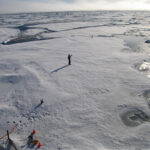
The melting of sea ice in the Arctic has slowed dramatically in the past 20 years, scientists have reported, with no statistically significant decline in its extent since 2005.
The finding is surprising, the researchers say, given that carbon emissions from fossil fuel burning have continued to rise and trap ever more heat over that time.
They said natural variations in ocean currents that limit ice melting had probably balanced out the continuing rise in global temperatures. However, they said this was only a temporary reprieve and melting was highly likely to start again at about double the long-term rate at some point in the next five to 10 years.
The melting of sea ice in the Arctic has slowed dramatically in the past 20 years, scientists have reported, with no statistically significant decline in its extent since 2005.
The finding is surprising, the researchers say, given that carbon emissions from fossil fuel burning have continued to rise and trap ever more heat over that time.
They said natural variations in ocean currents that limit ice melting had probably balanced out the continuing rise in global temperatures. However, they said this was only a temporary reprieve and melting was highly likely to start again at about double the long-term rate at some point in the next five to 10 years.
Click this link for the original source of this article.
Author: Marty Kaufmann
This content is courtesy of, and owned and copyrighted by, https://www.offthepress.com and its author. This content is made available by use of the public RSS feed offered by the host site and is used for educational purposes only. If you are the author or represent the host site and would like this content removed now and in the future, please contact USSANews.com using the email address in the Contact page found in the website menu.





